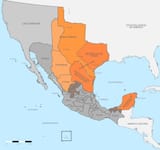>>512868662
>>512899318
(Part 2)
As Mexico began to gain further control over its claimed territory, these areas needed to be settled and assimilated into Hispanic Catholic culture, as well as overseen by the elite landowning class, protected by conquistadors and expeditionary forces who would be willing to mount defenses from forts as well as embark on punitive campaigns when confronted with belligerent tribes. Much effort was put into this, but over time lack of appreciation and difficulty, as well as neglect and exploitation by the Central government made everyone in the peripheral areas of Mexico resentful. In times of political turmoil and economic uncertainty, countless uprisings would spring up around the country, sometimes lead by ideologically dedicated commoners, and other times by the planter class/landed gentry. Take for example the federalist rebels, who wanted a system in which Mexican states would have more autonomy and local, individual representation on account of the size of the country, isolation of peripheral provinces, and the inability or lack of desire of the central government to properly attend to these areas while simultaneously having no qualms or reservations about exploiting them. These rebels correctly assessed that Mexico would inevitably fall apart as those in more remote areas did not view themselves as fundamentally Mexican, and even those who did felt as if there would eventually be no choice other than secession, if for no other reason than self-preservation. This prediction became reality when various parts of the nation did make serious attempts at splitting off from the main body. Contrary to popular belief, the secession of Texas and California were not exclusively Anglo affairs, but also enjoyed broad support from the less dense peripheral Hispanic population, who, after annexation, publicly renounced all ties to the Mexico which they never truly felt themselves to be apart of, and swore allegiance to the United States.
